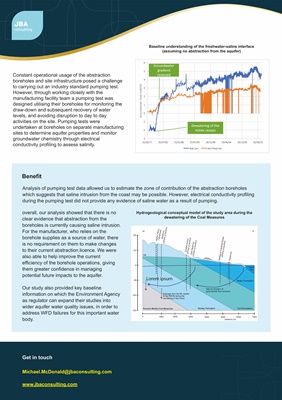
michael.mcdonald@jbaconsulting.com
www.jbaconsulting.com
Get in touch
Benefit
overall, our analysis showed that there is no
clear evidence that abstraction from the
boreholes is currently causing saline intrusion.
For the manufacturer, who relies on the
borehole supplies as a source of water, there
is no requirement on them to make changes
to their current abstraction licence. We were
also able to help improve the current
efficiency of the borehole operations, giving
them greater confidence in managing
potential future impacts to the aquifer.
Our study also provided key baseline
information on which the Environment Agency
as regulator can expand their studies into
wider aquifer water quality issues, in order to
address WFD failures for this important water
body.
Constant operational usage of the abstraction
boreholes and site infrastructure posed a challenge
to carrying out an industry standard pumping test.
However, through working closely with the
manufacturing facility team a pumping test was
designed utilising their boreholes for monitoring the
draw-down and subsequent recovery of water
levels, and avoiding disruption to day to day
activities on the site. Pumping tests were
undertaken at boreholes on separate manufacturing
sites to determine aquifer properties and monitor
groundwater chemistry through electrical
conductivity profiling to assess salinity.
Baseline understanding of the freshwater-saline interface
(assuming no abstraction from the aquifer)
Lorem ipsum
Analysis of pumping test data allowed us to estimate the zone of contribution of the abstraction boreholes
which suggests that saline intrusion from the coast may be possible. However, electrical conductivity profiling
during the pumping test did not provide any evidence of saline water as a result of pumping.
Hydrogeological conceptual model of the study area during the
dewatering of the Coal Measures